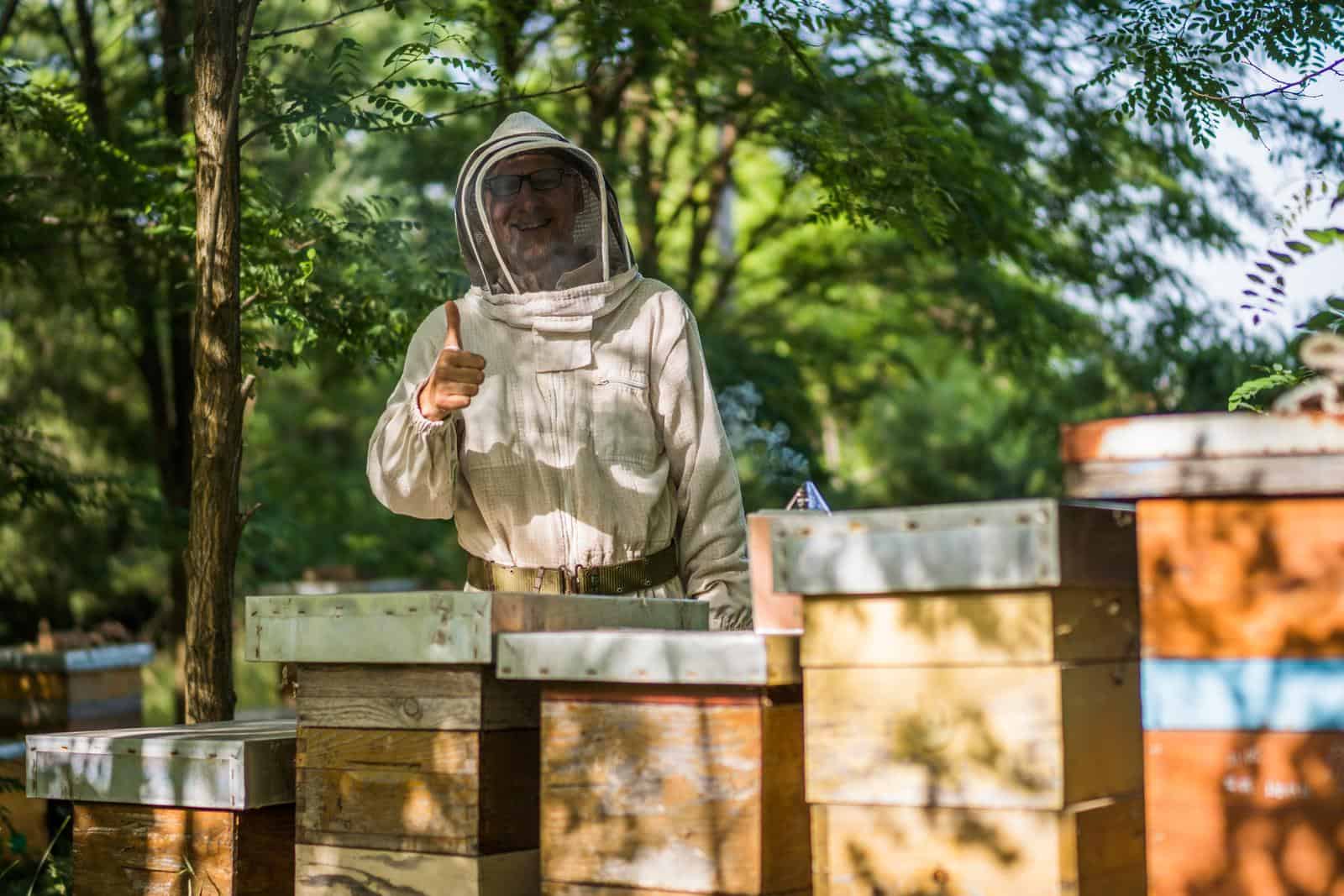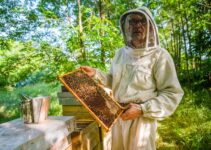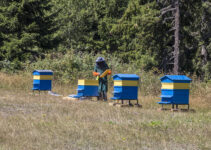Many beekeepers enjoy beekeeping as a hobby or simply produce enough honey for their personal use. Can you make a career out of beekeeping and work full-time as a beekeeper, or turn your hobby into a profitable business?
Beekeeping can be made into a career by either working for a commercial beekeeper or starting your own beekeeping business. Beekeepers can make a profit from pollination services, honey, beeswax, propolis, queen rearing, or selling swarms of bees. The income focus will depend on the region.
The great thing about beekeeping is that you can make your beekeeping operation as low-key or as detailed and complex as you would like it to be. Is it feasible to work full-time in the beekeeping industry or expand your hobby into a career?
Can Beekeeping Be A Fulltime Job?
Beekeeping is enjoyable and rewarding as a hobby, but it is also an important aspect of the agricultural industry across the world.
Several aspects of beekeeping need consideration to investigate the feasibility of beekeeping as a career.
- Demand for beekeepers
- Work for a beekeeper or keep your own bees
- How to gain experience as a beekeeper
- Potential earnings for beekeepers
Many of these aspects will have regional differences, so looking at these options from your local perspective rather than a general assumption is important.
Is There A Demand For Beekeeping?
Beekeeping is the same as any other industry and has dips and upswings in its demand levels. Since beekeeping is also affected by changes in the agricultural sector, this will affect the demand for beekeepers from time to time.
One of the largest services beekeepers provide is crop pollination services to the agricultural industry. The agricultural industry is itself driven by market demand.
When farmers change to alternative, higher-profit crops that do not need pollinators, it will affect the demand for pollination services in the beekeeping industry.
However, as long as food crops are grown to feed the world’s population, pollination services will be needed.
Another aspect that continues to drive demand for beekeepers is the public’s increased general health consciousness. Honey is seen as a natural food and provides healthier sugars than the refined sugars in many of our modern foods.
This knowledge is fueling a general drive for healthier food consumption, including honey, which boosts the demand for honey and the product’s price.
Consequently, there is sufficient demand in the beekeeping industry for more beekeepers to service the market with the various products and services we get from bees.
From a local perspective, if you do not live in a rural or semi-rural area where agricultural activities abound, pollination services may not be viable for a beekeeping business.
On the other hand, people are willing to pay more in an urban setting for natural, raw honey, and there is a demand for honey in the restaurant and hotel industry.
There would also be a market for beeswax in industrial areas that use beeswax in their manufacturing, such as beauty products.
Should You Get A Job As A Beekeeper Or Keep Your Own Bees?
There are two ways beekeeping can become an income-generating activity or a potential career for aspiring beekeepers.
You can go to work for an established beekeeping company or operation, or you can build your beekeeping hobby into a profitable enterprise.
Building a beekeeping business is slow going and can be expensive as you expand your operation. Learning as you go can also result in mistakes that can set your business back if you go it alone.
If you have the time and the funds, this is an ideal option to be your own boss and build a rewarding business.
Working for another beekeeper will allow you to earn a salary while learning the ins and outs of professional beekeeping. This will be a faster method of gaining experience and knowledge of what it takes to run a beekeeping business.
You can also build your own bee business and expand your colonies while working as a beekeeper for someone else.
Beekeepers are classified as part of the agricultural industry and can expect to earn up to $68000 as an average annual income.
How Do You Gain Experience As A Beekeeper?
Working with bees is much the same as working with other livestock. There is a lot to learn about the bees themselves as well as how to take care of them and keep them happy and productive.
Knowledge is a crucial aspect of making a successful career in beekeeping, whether you are self-employed or working for another beekeeper.
How can you gain the knowledge necessary to learn all the aspects of a beekeeping business?
There are several methods to gain experience and knowledge to improve your beekeeping skills to the point that you can earn a living in the industry.
Become A Beekeeping Apprentice
If you are interested in a career in beekeeping, a beekeeping apprenticeship with a commercial beekeeper is a great opportunity to learn about the industry.
As an apprentice, you will spend time learning each aspect of the business, rapidly expanding your beekeeping knowledge while earning an income.
We have a detailed article called “What Is A Beekeeping Apprenticeship + How To Get On One?” which covers this topic in some depth.
Take Up A Beekeeping Internship
An internship is similar to an apprenticeship but is not full-time, and you do not get paid as an intern.
An internship is valuable for gaining experience from beekeepers that have been in the industry for some time. You can participate in beekeeping activities where you need to build your skills rather than following a formal training program.
As an intern, you gain valuable knowledge, and the beekeeper you are learning from gains free labor and assistance.
We have an article dedicated to beekeeping internships called “What Is A Beekeeping Internship + How To Get On One?” where we teach you all about gaining knowledge through this training method.
Take A Beekeeping Course
There are many beekeeping courses available that will teach you about beekeeping, from basics to advanced techniques. This training is useful to boost your knowledge, especially in taking courses around specific topics, such as queen rearing, feeding bees, splitting hives, etc.
Beekeeping is a practical activity and is often best viewed or taught in a practical setting. In my experience, courses in your local area that allow you to interact physically with the bees produce a better quality learning experience than simply learning the theory.
Local courses will also offer knowledge and experience specific to beekeeping challenges in your area, which can be important when learning new skills.
Join A Beekeeping Association
Most areas where beekeeping is popular or possible will have a beekeeping association where beekeepers meet to discuss their industry and learn from each other.
There is usually no restriction on joining these associations other than being a beekeeper, meaning there will be a cross-section of members from hobbyists to commercial beekeepers.
Beekeeping associations are a great place to learn from beekeepers who have local knowledge about keeping bees in your region and the laws regulating the industry in your area.
How Do Beekeepers Make Money?
There are several ways beekeepers can make money from bees, and the focus on the sector that generates the most income will vary from region to region.
Beekeeping operations make money in the following ways.
- Pollination services. Beekeepers bring bees onto crops as a service to farmers to boost the production yield of the crops. Bees can significantly increase the yield of many food crops, which will increase the farmer’s profits.
- Honey production. Honey is often a secondary income for commercial beekeepers, below pollination services as the primary income generator. Hobbyists usually focus on honey as the main bee product.
- Beeswax. Beeswax has commercial applications in a variety of industries and can generate profits for the beekeeper.
- Propolis. Propolis is another bee product that is in demand for various industrial and cosmetic applications. It is difficult to harvest in large quantities and purity, but it fetches a good profit for beekeepers.
- Queen rearing. Raising queens for sale to other beekeepers can be a lucrative income source for beekeepers.
- Selling swarms. Multiplying colonies by splitting produces additional colonies that the beekeeper can sell for a profit.
There are many aspects of beekeeping that can generate a profit that a beekeeper can build a business around; the key is to find the right market for your service or product.
Conclusion
Beekeeping is a viable career opportunity, and the industry is short of beekeepers that provide ethical services and products to the industry and consumers. Beekeeping is physical work and long hours, which sometimes deters people from entering the industry.
Choosing beekeeping as a business or a career is an ideal opportunity for a person who is not afraid of hard work and loves working outdoors with nature. Beekeeping can be a lucrative and profitable career for anyone willing to put in the effort.
References
Writer’s personal experience
https://www.usda.gov/media/blog/2017/06/20/being-serious-about-saving-bees
https://www.liveabout.com/beekeeper-career-description-125609




